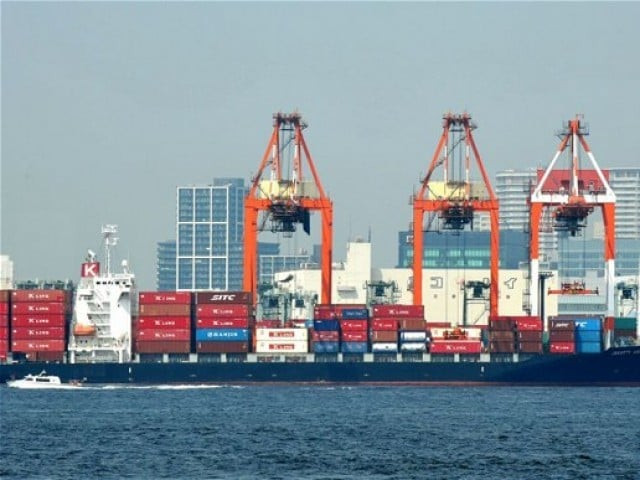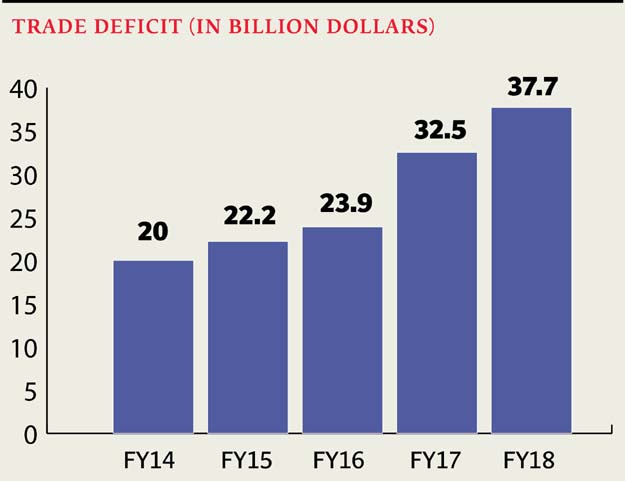Pakistan’s trade deficit skyrockets to historic high
Despite currency devaluation, imports near $61b in FY18

The devaluation could not contain the import bill but it added Rs1.190 trillion in public debt, according to Director General Debt Office’s statistics.
PHOTO:AFP
The trade deficit in the 12 months of fiscal 2018 stood at $37.7 billion with imports standing at a record $60.9 billion.
The gap between exports and imports weighed heavily on the country’s external sector and pulled official gross foreign currency reserves down to a single digit. The deficit not only broke the year old record but also surpassed the government’s own revised estimate.
“During fiscal year 2017-18, trade deficit stood at $37.7 billion, which was 16% or $5.2 billion more than the comparative period of the previous year,” the Pakistan Bureau of Statistics (PBS) announced on Wednesday.
Trade deficit widens to $27.3 billion even as Pakistan records higher exports
The last government of the PML-N had projected to limit the deficit to $25.7 billion. In April, it revised the estimates to $29.4 billion. However, the final trade gap was $12 billion higher than the original estimates of the Ministry of Finance, highlighting its severe capacity constraints.
The fresh statistics have deepened concerns about long-term sustainability of the external sector, which the last government maintained by borrowing from foreign countries and commercial banks. The results suggest that another bailout programme from the International Monetary Fund is now just a matter of time.

According to experts, cheap imports from China have also started to hurt import-substitution industries.
Owing to the swelling trade deficit, the country’s balance of payments is now projected to worsen to levels never anticipated by the finance ministry.
In its budget documents, the ministry has now revised the current account deficit projection to $9 billion for the last fiscal year. The eleven-month current account deficit has already widened to $16 billion.
Former finance minister Ishaq Dar is being blamed for this poor economic show. Caretaker Finance Minister Dr Shamshad Akhtar on Wednesday blamed the weak economic management for a 15-year high debt level of 72% of the GDP. The financing of the current account deficit by taking more loans was also one of the reasons for high debt accumulation.
Pakistan’s trade deficit widens 14.3% to $29.8 billion
Exports increased 13.7% to $23.2 billion in last fiscal year, which were $2.8 billion higher than the comparative period of the preceding year. But an increase of $2.8 billion in exports in the year was not even sufficient to finance a month’s trade deficit that remained above $3.8 billion. Exports remained below the revised estimates of $24.9 billion.
In comparison, the import bill widened 15.1% to $60.9 billion in last fiscal year. It was the highest ever import bill that Pakistan paid in a single year since its creation.
“Pakistanis love to consume but high trade deficit is no more sustainable,” said Akhtar.
In absolute terms, imports were $8 billion higher than the preceding year.
The devaluation could not contain the import bill but it added Rs1.190 trillion in public debt, according to Director General Debt Office’s statistics.
Current account deficit widens 28.74% to $1.61b
The trade deficit in June was 46.1% more compared to the corresponding period of the previous year and the main reason was record imports worth $5.7 billion in the month, showed PBS data. The trade deficit stood at $3.8 billion in June, which in absolute terms was $1.2 billion higher than the deficit in June 2017.
The imports in June grew 26.2% to $5.7 billion. In comparison, exports in the month dropped 1% to only $1.9 billion.
On a month-on-month basis, exports in June slumped almost 12% compared to May. In absolute terms, exports were down $257 million. There was a marginal contraction in imports on a month-on-month basis.
Published in The Express Tribune, July 12th, 2018.
Like Business on Facebook, follow @TribuneBiz on Twitter to stay informed and join in the conversation.



















COMMENTS
Comments are moderated and generally will be posted if they are on-topic and not abusive.
For more information, please see our Comments FAQ